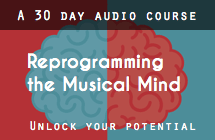Practicing is the most important thing you can do as a musician. Or so everyone says…But let’s be honest, practicing can be a real drag sometimes. It can feel like the daily chore that you can never escape. Hours of tedious warm-up routines, endless technical exercises, and slogging through every key while staring at the seconds ticking by on the clock…
Yet, somehow the world’s greatest musicians learned to embrace the art of practicing and even love it. And if you’re serious about becoming a successful musician, you’ve got to do it too.
So what was their secret? Well, the key to loving your practice often comes down to what you’re not doing.
And what you’re not doing are 3 simple techniques that turn practice from a daily chore into one of the most productive activities in your musical life.
Let’s start with number one…
I) Your practice doesn’t have a personal goal
Why do you practice? What’s the point?
For most musicians the reason for practicing comes from other people.
Your parents push you to practice, your teachers give you assignments, that cranky old piano instructor threatens you every week, and there’s the constant pressure to keep up with your friends and colleagues.
All of this is hanging over your head as you walk into the practice room…
As a musician, you know that practice is expected of you…but have you ever stopped to ask what you want?
Finding the answer to this question is the single most important thing you can do to improve and actually enjoy your practice time. So stop practicing to please other people or to fulfill an obligation.
You should have a personal reason to walk into the practice room – a mission that’s connected to the reason you were drawn to music. Inspiration, wonder, excitement, fun.
Because at the end of the day your practice is all about you. It’s your time to develop technique, your time to listen to your favorite players, and your time to choose the direction you want to take in music.
Think about it: What musicians do you aspire to sound like? What solos do you want to transcribe? What tunes are you going to learn? What have you always wished you could do as a musician?
These are the things you should be practicing.
Connect to the driving force from your love of music and go into the practice room with the aim of achieving these goals. Not only will you improve faster – it’ll actually be fun!
Curious about what to practice or looking for some effective ideas for the woodshed? Take a look at this slideshow to learn how to get more focused and productive with your daily practice:
II) You’re starting with the wrong mindset
What most musicians don’t know is that effective practice starts before you even touch your instrument…
It starts with your mindset.
We all carry around certain beliefs or feelings about music. Experiences from past performances, mistakes in learning, limiting beliefs about our skill set or lingering self-doubt.
All of this can subconsciously affect your productivity in the practice room.
Maybe you’re getting forced into the practice room by other people and music is starting to feel like a homework assignment. Or maybe you’re rushing through exercises because of competition, self doubt, boredom, a lack of creativity.
It’s this mental “baggage” and uncreative environment that can destroy your practice time and even affect your relationship with music.
We’ve all been there. But this doesn’t mean that you should give up on practicing or even music. You simply need to change your mindset before you get into the practice room.
Strive to get into a relaxed, productive and creative space every time you play your instrument. Aim to free your mind from negativity, stress, and the pressure of competition.
This is your time to slow down, focus and work on reaching your musical goals.

When you reconnect with your love for music and clear your mind, your practice will be much more effective. Remember, it’s enough work learning how to improvise, you shouldn’t let nerves, competition, and negative mindsets get in your way.
III) You’re not consistent
Effective practice is all about showing up everyday.
In fact, consistent and focused time with your instrument is the only way that you’re going to make progress.
Now this doesn’t mean that you have to spend 10 hours a day in the practice room to see improvement, but you do have to be consistent in working toward your goals.
This means allotting some time each day to focus on music. It can be time on your instrument, time spent working on ear training, or even some focused listening to your favorite solos. All of it will improve your musicianship.
Remember, having a “cram session” once a week is less effective than spending 20 focused minutes every day.
So pick a goal and spend some time each day working on achieving it piece by piece. This is your chance to improve at the thing that you love doing. Instead of a chore that you force yourself to do every now and then, it’ll become a daily habit that you won’t want to miss.
You’ll actually look forward to that time each day that you get the opportunity to improve your craft. That time in the practice room that you have each day to work on your goals.
If you want to retain the information that you’re practicing, you’ve got to be consistent.
How to enjoy practicing again
I still catch myself practicing the wrong way…
Picking up my instrument without a goal, going through the motions, feeling pressure to rush ahead and sudden nerves for an upcoming performance.
This is life as a musician.
But the difference now is that I know to stop, take a deep breath and correct myself. To spend a few minutes getting into the right mindset, to reassess my musical goals, and to make sure I devote some time each day to practice.
It all sounds simple in theory, yet it’s highly effective when you put it into practice.
Try out these three techniques and I promise you that you’ll look forward to that time in the practice room!












